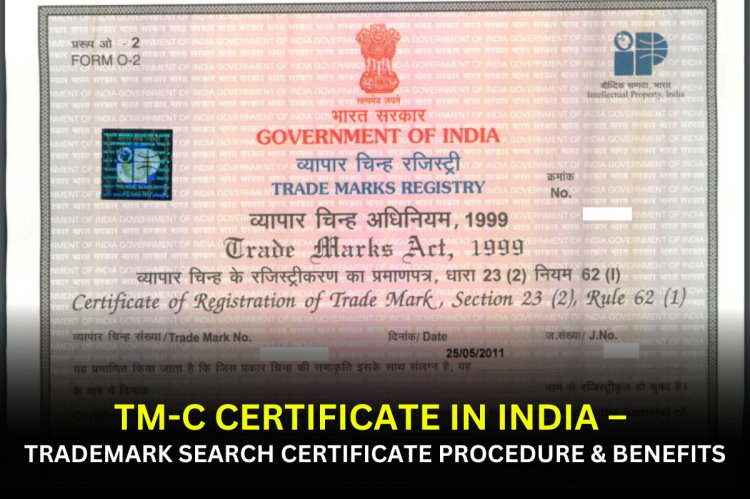TM-C Certificate in India – Trademark Search Certificate Procedure & Benefits
Learn everything about the TM-C Certificate, a crucial due diligence tool issued by the Indian Trademark Registry. Understand its importance, benefits, and step-by-step procedure for obtaining the Trademark Search Certificate under Rule 22 of the Trade Marks Rules, 2017.

WHAT IS A TM-C CETIFICATE?
A Trademark Search Certificate is a formal document issued by the Office of the Controller General of Patents, Designs and Trade Marks (CGPDTM), which operates under the Ministry of Commerce and Industry, Government of India. This certificate is issued following a thorough search of the official trademark registry to determine whether a proposed trademark bears similarity—either identical or deceptively similar—to any pre-existing registered or pending trademarks.
The primary aim of this certificate is to provide official confirmation regarding the availability of a trademark for registration and commercial use. It forms a crucial part of the due diligence process undertaken before filing a trademark application or launching a new brand or product in the market.
IMPORTANCE OF TRADEMARK SEARCH CERTIFICATE
A Trademark Search Certificate holds substantial practical value for individuals and entities intending to secure exclusive rights over a brand name, logo, slogan, or any other distinctive mark. While not mandatory under law, obtaining this certificate is considered a best practice in intellectual property management for the following reasons:
1. Prevention of Trademark Infringement
One of the primary purposes of a trademark search is to avoid the risk of unintentionally infringing upon an existing registered or applied-for trademark. A search certificate serves as official proof that the trademark records have been carefully reviewed for potential conflicts. This process helps detect identical or deceptively similar trademarks already in existence under the same or related class of goods/services.
2. Facilitating the Trademark Registration Process
The issuance of a search certificate helps streamline the registration procedure and it acts as a pre-filing due diligence tool to assess the registrability of a proposed mark under Section 11 of the Trade Marks Act, 1999, which outlines the relative grounds for refusal of registration. If the certificate reveals existing conflicts, applicants can take informed decisions to redesign or refine the mark before formally submitting the trademark application using Form TM-A.
3. Proof of Due Diligence and Good Faith
In any subsequent dispute such as an opposition under Section 21 or rectification proceedings, a trademark search certificate can serve as evidence that the applicant acted in good faith by taking prior initiative to check if the mark is available before seeking exclusive ownership.
4. Legal and Commercial Due Diligence Tool
In commercial transactions involving intellectual property assets, such as licensing of trademarks, franchise agreements, mergers or acquisitions and brand valuation exercises. It demonstrates that the brand in question has been verified for legal risks and does not face imminent challenges related to trademark rights.
To know more about this you can follow the link below:
PROCEDURE TO OBTAIN A TRADEMARK SEARCH CERTIFICATE
1. Preparation for Filing- The applicant must be prepared with certain essential information. First and foremost, the exact form of the proposed trademark must be clearly identified. This could be a wordmark, a logo (device mark), a slogan, or a combination of these elements. The precise representation of the trademark is crucial for conducting an accurate search against existing records in the trademark registry. In addition to the mark itself, the applicant must determine the correct class or classes of goods and services under which the trademark will be used.
2. Filing Form TM-C- The request for a search certificate is made using Form TM-C, as prescribed under the Trade Marks Rules, 2017. This form can be filed online through the official intellectual Property website
3. or physically at the appropriate Trademark Registry office.
4. Payment of Prescribed Fee must be made
5. Examination by the Registry- Once the form and fee are submitted, the Registry examines the database of trademarks registered and/or pending under the requested class(es). The search is conducted based on phonetic similarity, visual similarity, and classification overlap.
6. Issuance of the Search Certificate- After conducting the search, the Registrar issues an official certificate/report stating whether any identical or deceptively similar marks exist on the register, the status of any conflicting marks and the details of such marks, including their application/registration numbers, owners, and status.
A search certificate does not grant any rights it only serves as a preliminary check. Actual registration still depends on formal examination and third-party opposition. The certificate is typically valid as of the date of issuance. Since trademark databases are dynamic, it’s advisable to use it promptly. The Registrar is not bound by the search report while deciding an actual trademark application. The final decision may still involve objections under Section 11 of the Act.
CONCLUSION
Obtaining a Trademark Search Certificate through Form TM-C is a structured and legally recognized process under Rule 22 of the Trade Marks Rules, 2017. While not compulsory, it serves as a critical risk assessment tool before filing a trademark application or launching a brand in India. It demonstrates diligence, helps in avoiding infringement, and adds value in legal and commercial contexts.












